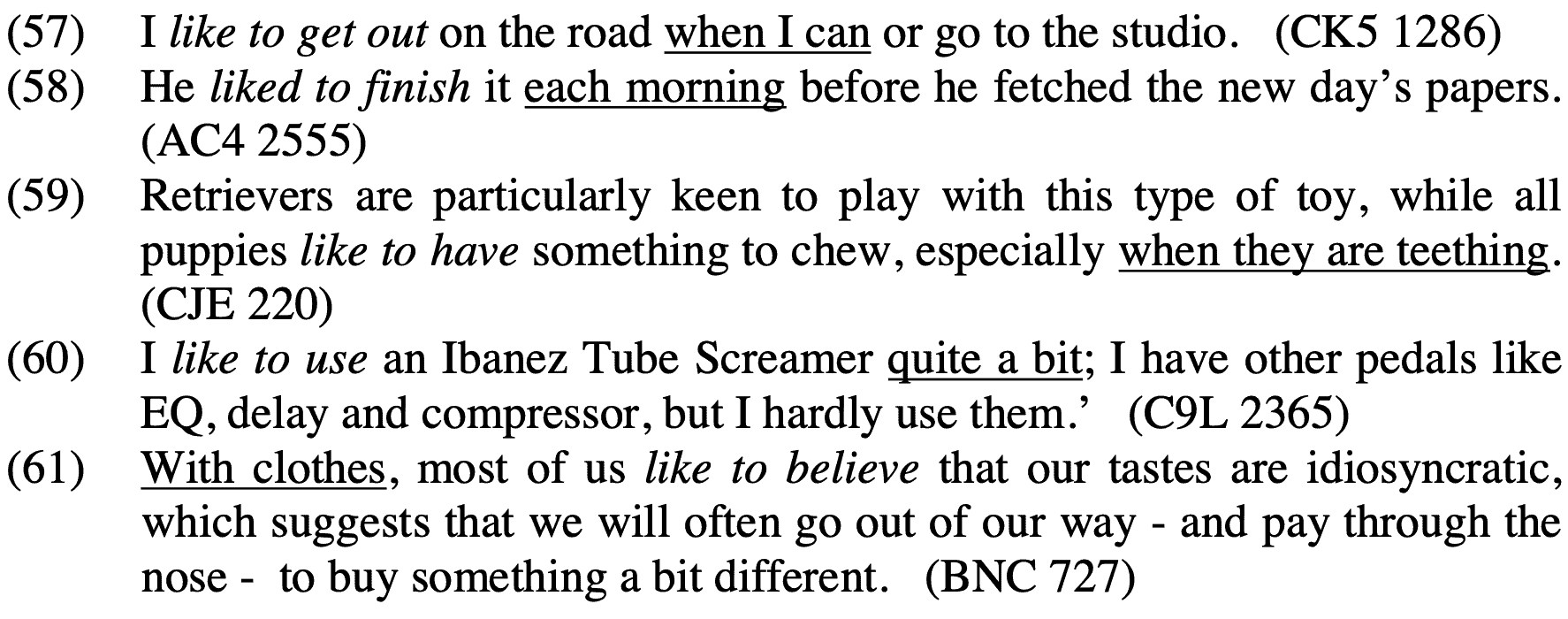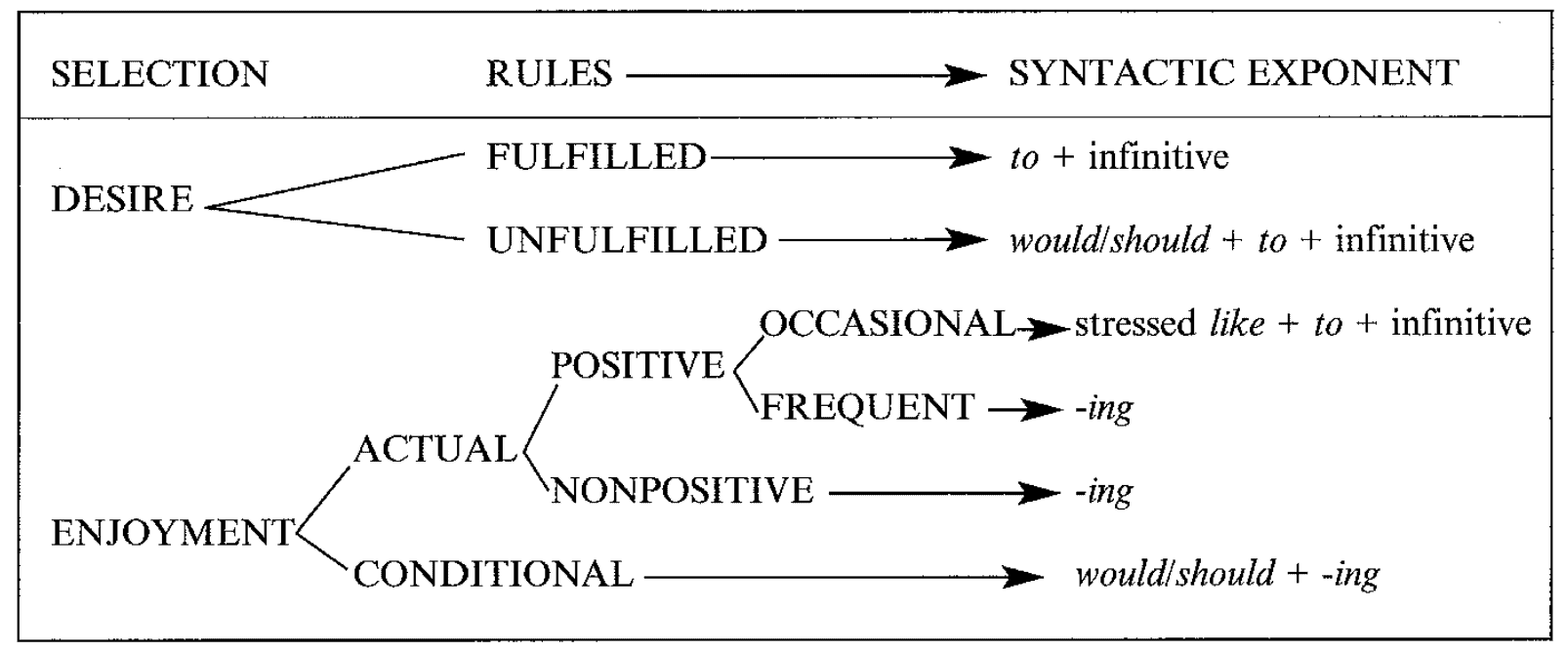Like to or Like ing?
My last post here on English Coach Online explored the defining features of gerunds and to-infinitives and the differences between them. In that post, I promised to examine the like to or like ing dichotomy in the following post. Therefore, I shall now examine the verb like when it is followed by the infinitive and the gerund.
Like to or Like ing? - Background
Before I go into the finer nuances of the like to or like ing debate, it’s worth noting that deciding on whether to use a to-infinitive or gerund after like goes a little deeper than whether one is a Brit and American.
Traditionally, the British tend to use a gerund after verbs which describe feelings, such as like, love, enjoy and hate. Hence, you will hear most Brits saying I like partying. Conversely, you’re more likely to hear to-infinitive forms in other English-speaking countries, such as the USA. Cue Hank from Illinois: I love to party.
Still, I believe there are no hard and fast rules concerning who in a particular region of a particular country might use a gerund or to-infinitive after like.
My concern in this post is not with these shady geographical considerations but the difference in the meaning between the two forms.
Let’s compare some situations in which gerunds and to-infinitives are commonly used after like, beginning with the gerundial form.
Key associations between like and the -ing complement
Having read a few major studies of to-infinitive and -ing clauses, notably Egan (2008) and Duffley (2004), I’m in a strong position to illuminate which meanings and notions are most strongly associated with the -ing complement:
General meaning
Most online dictionaries and online blog posts tend to highlight that like is followed by a gerund when the meaning is general. Therefore, saying I like dancing does not give off any specific details regarding the specific types of dance one is into nor when or where one likes to dance. The focus is merely on the experience and action of dancing. Frederick T. Wood (1956, p.13) discussed the various distinctions of usage between gerundial and to-infinitive forms, noting that:
The gerund denotes something more general, the infinitive something more specific.
The notion of ‘enjoyment’
In relation to why the verb like is followed by an -ing complement, the notion of ‘enjoyment’ often crops up in the literature. This enjoyment may be actual or conditional, as Duffley (2004, pp.363-364) highlights with the following two examples:
He likes going home by car (actual)
I think I’d like interviewing a man of such renown (conditional)
The simultaneous nature of the pleasure
It’s necessary to pay heed to the “simultaneous nature of the pleasure afforded by participation in the activities in the complement clause” (Egan, 2008, p.65). The following examples (Egan, 2008, p.65) support Egan’s view:
Like you, I enjoy running my own business.
I wish I had some bread - I like feeding the ducks.
Yes but you can still revolt against something you like doing.
Wierzbicka (1988, p.60) states that: “If we enjoy doing something, we enjoy it at the very time when we are doing it”. In the example sentences above, the situation which prompts the pleasure felt coexists with the feeling of that pleasure. Hence, simultaneity is key. The use of the gerund simply overlooks pleasures of recollection or anticipation/expectation.
In summary, we may use the -ing form after like to emphasise the experience or action as well as to suggest enjoyment or pleasure. The experiencer’s feelings about an activity as it unfolds seem to matter most. A final implication is that these situations and activities are ongoing and recurring ones.
Key associations between like and the to-infinitive complement
Choosing between like to or like -ing becomes much trickier when you consider that the to-infinitive may exhibit many more meanings than the -ing complement. Let’s check out some of the key meanings of the to-infinitive after like:
1. Preferences
The example sentence below (in Egan, 2008, p.28) shows how one acquires a particular preference as one gains experience with an activity:
As Mary admitted she liked to see the videos first alone - she also may have found the situation rather threatening.
Clearly, the addressee is aware that Mary prefers to watch videos unaccompanied, whenever called upon to view one. In terms of the application of ‘like to-infinitive’, the key point here is that one develops a preference through experience when faced with two or more options. Feasibly, Mary could have watched the videos first in the company of another person or a larger group of people.
To sum up, Egan (2008, p.107) states that the ‘like to-infinitive’ construction “refers to a recurrent scenario preferred by the subject to possible alternatives.”
2. ‘Be in the habit of’
During late childhood boys like to tease, jostle, and talk smart to girls;
(Brown University Corpus J47 0740, in Duffley, 2004, p.372)
3. Situations which are likely to occur at more or less regular intervals
Intriguingly, Egan (2008, p.34) states that there is no consensus in the literature regarding how to interpret the construction in the following sentence:
In the afternoon my wife likes to go out and look around car boot sales.
Nevertheless, Egan (2008,p.34) proposes that such constructions profile situations “as likely to occur at more or less regular intervals”. Going one step further, Egan argues that the subject realises these situations “on all suitable occasions”.
Egan (2008, p.35) offers another situation containing like followed by a to-infinitive complement with the verb ‘regularly’:
If you like to drink alcohol regularly, you will probably find this is the most pleasant week of the diet, provided you don't experience a reaction to it.
4. Situations which are likely to occur at irregular intervals
If one examines corpora, as Egan has done, they will find plenty of situations containing ‘like to-infinitive’ which are likely to occur whenever a suitable opportunity presents itself, i.e. at irregular intervals.
Egan (2008, p.35) dug out the following example in his study of infinitive and -ing clauses:
Martin occasionally, and fancifully, likes to picture himself as a daredevil cuester, a flashing Jimmy White to my grinding Cliff Thorburn.
The adverb ‘occasionally’ clearly denotes the irregularity of the event.
Here’s another example (in Egan, 2008, p.77) in which the action of ‘going home’ is likely to occur at irregular intervals in time:
We don't want the problems on our own doorstep cos when the chips are down, we like to go home, and we like to feel safe and if somebody's entered your premises as an intruder then all of a sudden your security been taken away.
The key point in the example above is that the action is dependent on another situation, i.e. when the chips are down.
5. Situations which occur invariably
If we take the following situation (in Egan, 2008, p.35) at face value, replacing love with like, then ‘like to-infinitive’ describes events which occur invariably, i.e. on all suitable occasions:
Is there a certain time when you always love to sit down with a relaxing drink and something to eat?
6. Like + to-infinitives together with adverbials
A plethora of adverbial types may be used in conjunction with the ‘like to-infinitive’ construction. The following examples with the adverbials underlined appear in Egan (2008, p.36):

In Egan, 2008, p.36
In all of the examples above, the likely occasions of realisation are all encoded explicitly. For instance, the adverbial in (57), “when I can”, implies the realisation of the complement situation on all suitable occasions. It simultaneously implies that such occasions are not likely to come about all that often.
The to-infinitive in the following example is used in what Egan terms a General construction:
Whatever our Customers want to say, we like them to speak to the staff at Shell stations first.
Again, the to-infinitive (to speak) encodes a likely candidate for realisation (Egan, 2008, p.53).
7. Varying degrees of satisfaction
One thing that makes choosing between like to or like -ing difficult for learners of English is whether the pleasure is simultaneous (as with the ‘like -ing’ construction, or it encodes enjoyment and pleasure of various forms on a more occasional basis (as with the ‘like to-infinitive’ construction).
Egan (2008, p.166) offers some fascinating insight into the nature of the satisfaction which the subject strives to achieve in the ‘like to-infinitive’ construction. For instance, the satisfaction may be moral or sensual in nature, or indeed purely “afforded by a good conscience”. In terms of being morally principled, check out the following sentence (Egan, 2008, p.166):
Similarly, since most men like to be seen to do the paying, it is a tactful precaution if, at the start of the evening out, she gives him the theatre tickets ‘to take care of’...
8. ‘Try to if one can’
I like to get as much as possible of this planting done in November while the temperature of the soil is still fairly high, for this gives the roots a reasonable chance to get themselves established.
(Lancaster-Oslo/Bergen Corpus E08 69, in Duffley, 2004, p.372)
9. 'Always be ready and willing to'
She is a beautiful filly and likes to trot.
(Brown University Corpus E09 0910, in Duffley, 2004, p.372)
10. 'want, wish'
First of all, no unit likes to have a new CO brought in from outside, especially when he's an armchair trooper.
(Brown University Corpus F22 0270, in Duffley, 2004, p.373)
11. 'tend to'
A man has 32 souls, one for each part of the body. Those souls like to wander off, and must be called back.
(Brown University Corpus F24 1660, in Duffley, 2004, p.373)
12. ‘be fond of’
She skipped a piece of water at him and laughed, a funny, hoarse laugh he liked to hear.
(Brown University Corpus P16 1240, in Duffley, 2004, p.374)
13. ‘be happy to’
A fascinating letter has just reached this desk from a correspondent who likes to receive so-called junk mail.
(Brown University Corpus B07 1655, in Duffley, 2004, p.374)
14. 'have an inclination to', 'be inclined to', ‘have a disposition to’
Find out what you like to do most and really give it a whirl.
(Brown University Corpus F06 0490, in Duffley, 2004, p.372)
'Ballad of a Soldier' was a simple story of a pure young boy and a pretty girl falling in love. It was something with which audiences liked to identify themselves.
(Lancaster-Oslo/Bergen Corpus G49 135, in Duffley, 2004, p.372)
Duffley (2004, p.376) identifies these two particular cases as problematic because “the infinitive evokes an event which happens to the subject of like …, over whose occurrence the latter has no control.” One assumes, however, that, if it were down to the subject, it would actualise the event as often as possible in the two situations above.
Like + to-infinitive - Summing Up
Overall, we get the sense that, with ‘like to-infinitive’, one does something whenever a suitable opportunity arises. The complement situations are usually fulfilled, much to the satisfaction of the subject.
Nevertheless, the possibility of non-execution is not totally ruled out, as Egan (2008, p.164) recognises with the following example:
I like to buy British, but the candle colours became uneven, delivery was unreliable and they were expensive.
Like to or like -ing - Summarising the Major Similarities and Differences
Now that I’ve shared the key meanings of both the to-infinitive and -ing form after like, it only seems right to examine like to or like-ing in more detail in order to pinpoint the similarities and differences between the constructions. Let’s begin by analysing a table (adapted by Duffley, 2004, p.363 - originally in Bladon, 1968, p.214) which neatly separates the key functions of ‘like to-infinitive’ and ‘like -ing’ forms.
Selection rules for gerund and to-infinitive syntactic exponents
The table below summarises the semantic selection criteria for gerunds and to-infinitives:

adapted by Duffley, 2004, p.363
Repeating what’s already gone before in this post, the notion of 'enjoyment' is generally associated with the -ing complement, regardless of whether the enjoyment is actual or conditional (with would and should).
Conversely, as Duffley (2004, p.363) takes up, “if like can be paraphrased by 'want', 'desire', 'intend' or 'go out of one's way', then it is construed exclusively with the to-infinitive.” The desire may either be fulfilled or unfulfilled, as in the construction with would/should.
According to Duffley (2004, p.364), the only exception to Bladon’s rules in the table above is the case of utterances in which stressed like is followed by the to-infinitive, such as the example below:
He likes to go home by car (but his parents can't often manage to fetch him) him).
The enjoyment of the event is implied. Nevertheless, it only occurs from time to time.
The feeling of satisfaction in the form of pleasure
We’ve already established that the same-time ‘like -ing’ construction allows for the pleasure felt (simultaneously) by the subject. Nevertheless, Egan (2008, p.166) shares plenty of example sentences with the ‘like to-infinitive’ which denote satisfaction which is of the pleasure and enjoyment variety:
- Choose long-lasting and highly water resistant products if they like to play in or around water
- With Joan Armatrading, we did 2-3000 seaters, and that just worked fantastically, especially as I like to communicate with the audience, and people these days aren’t used to that
- Just as well you’re away before father comes in; he likes to gossip
- I like to go round the park in Bognor and photograph squirrels
In the four examples above, we may conclude that the subjects also ‘like -ing’. For instance, if one likes to gossip, one also presumably likes gossiping.
Still, the fact remains that a ‘like -ing’ clause does not necessarily carry the same meaning as a ‘like to-infinitive’ clause. Returning to the example above regarding taking pictures of squirrels in the park in Bognor, one may infer from the to-infinitive that the subject chooses to do this activity over other activities whenever the opportunity arises. The subject derives a measure of satisfaction in the form of pleasure from the activity.
With ‘I like going round in the park in Bognor photographing squirrels’, the emphasis is purely on the pleasure gained from the activity. The speaker does not hint at preferences or pay heed to other alternative activities. Moreover, the speaker is seemingly not encumbered by time-related restrictions (in the form of adverbial clauses) when ‘like -ing’ is involved.
It’s worth pointing out that the matter of like to or like -ing may be unimportant to the speaker and addressee. The meaning of the two utterances (like going round in the park) and (like to go round the park) roughly equates to ‘I photograph squirrels in the park. I like that.’ (Egan, 2008, p.167). As Egan (2008, p.167) states:
If achieving a mutual understanding of these components is the main concern of the discourse participants, then it may matter little to them which of the two alternatives the speaker chooses.
There are also activities which may give us a feeling of well-being and a sense of accomplishment. However, these activities could never be described as pleasurable. This is where ‘like to-infinitive’ clauses come into play, as in this example (in Egan, 2008, p.167):
Their parents like to leave toys by the graves, but on several occasions they’ve returned the next day to find them missing.
It’s hard to imagine the activity of parents leaving toys by their, or other, children’s graves as pleasurable.
Egan (2008, p.167) points out that:
While there are many forms of satisfaction that do not necessarily imply pleasure, the opposite is not the case. The feeling of pleasure normally affords us satisfaction, and ‘like -ing’ clauses normally imply their ‘like to infinitive’ counterparts …
The following situation certainly characterises Egan’s (2008, p.168) claim:
I wish I had some bread - I like feeding the ducks.
Final Thoughts
Parrott (2000, p.170) states that it's hard to make a choice between a to-infinitive or gerund because the “rules which guide us may seem arbitrary to learners.”
Even though, as Parrott (2000, p.170) claims, serious misunderstandings seldom result from mistakes in choosing between infinitive and -ing forms, I still do not believe the discussion surrounding like to or like ing is a case of grammar nonsense. This is because the emphasis of one’s utterance can change significantly in certain contexts depending on whether one uses a ‘like to-infinitive’ or ‘like -ing’ construction.
References
Bladon, R. A. W. (1968), ‘Selecting the “to” or “-ing” nominal after “like, love, hate, dislike” and “prefer”’, English Studies, 49: 203-214.
Duffley, P.J. (2004) Verbs of Liking with the Infinitive and the Gerund, English Studies, 85:4, 358-380
Egan, T. (2008). Non-finite Complementation: A usage-based study of infinitive and -ing clauses in English, Amsterdam and New York: Rodopi
Parrott, M. (2000). Grammar for English Language Teachers, Second Edition, Cambridge: Cambridge University Press
Wierzbicka, A. (1988), The semantics of grammar. Amsterdam: John Benjamins.
Wood F.T. (1956), ‘Gerund versus infinitive’, English Language Teaching, 11:11-16.



